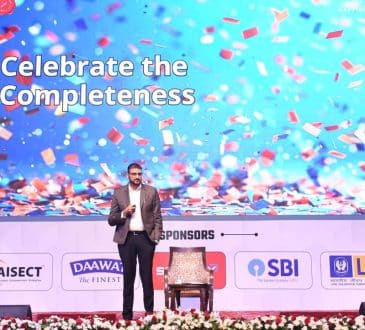The next money generating idea is not AI, it’s the monetization of your ethical soul

“Nike effect” is a term that I have been using to describe a specific corporate behavior: the ability to exploit cultural values of the society for profit while neglecting the same values. Consumers, particularly those targeted by Nike, may recall their recent performative activism, seemingly aligning themselves with progressive social stances. However, these gestures are often undermined by documented issues within the company’s supply chain, raising questions about their genuine commitment to these values. As brilliantly explored in this essay on Nike’s tactic of leveraging ‘tribal strategy’, their approach exposes a fundamental flaw in the attention economy. This strategy relies on emotionally charged messaging that appeals to consumers’ sense of identity and belonging, often masking a lack of meaningful societal impact. Despite the ethical concerns, it’s undeniable that the tactic worked. Nike experienced a near doubling of revenue growth rates between 2020 and 2023 compared to the previous period (2016-19).
However, this success story must be viewed within the broader context of the stagnation of the attention economy. As traditional methods of capturing attention reach their limits, we witness a surge of companies attempting to replicate the “Nike effect”. This trend suggests that this is not an isolated case, but a symptom of a larger shift in our economic landscape. This is my attempt to explore a way to frame this shift in our economy.
We live in value extracting cycles
The fundamental tenet of our current economic system is the perpetual pursuit of “value”. This value is not generated or created, rather it’s always extracted. Extracting value is fundamentally a question of monetization. And the question of monetization has always been answered, not by fostering innovation for meaningful upliftment of the society, but by building the next extractive cycle. During the Industrial Age, institutions monetized “time” by leveraging “energy.” This carbonfueled approach propelled them towards global reach and efficiency in extracting labor from people and resources from the environment. This model, though long-lived, eventually reached a plateau in the mid-20th century, leaving the industrial giants yearning for a new source of growth.
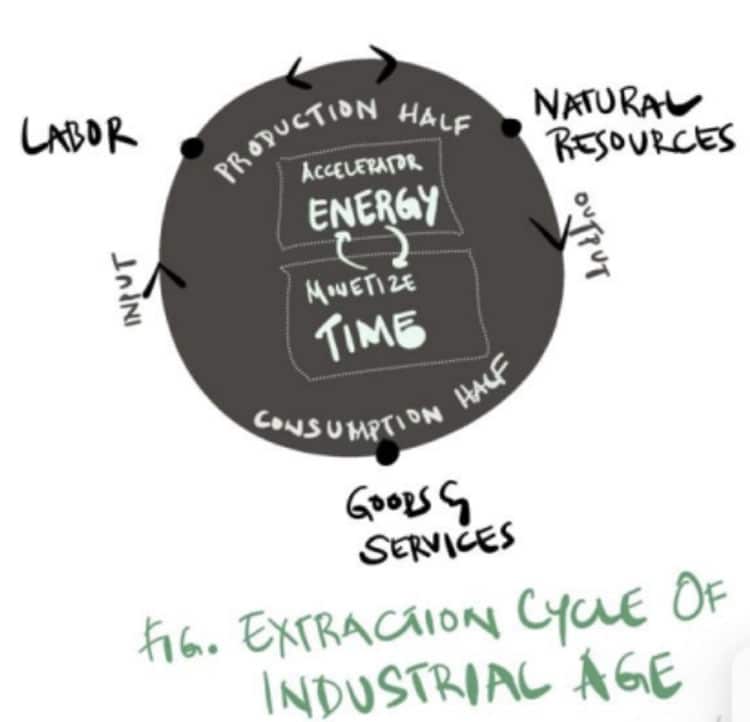
The value extraction cycle of the Industrial Age monetized “Time” by harnessing “Energy” Enter the digital tools of the Information Age. This era saw institutions turn their focus to monetizing “attention” through the power of “data”. These data-driven information systems further refined the extractive capacities inherited from the Industrial Age, enabling even greater efficiency in the exploitation of labor and natural resources.
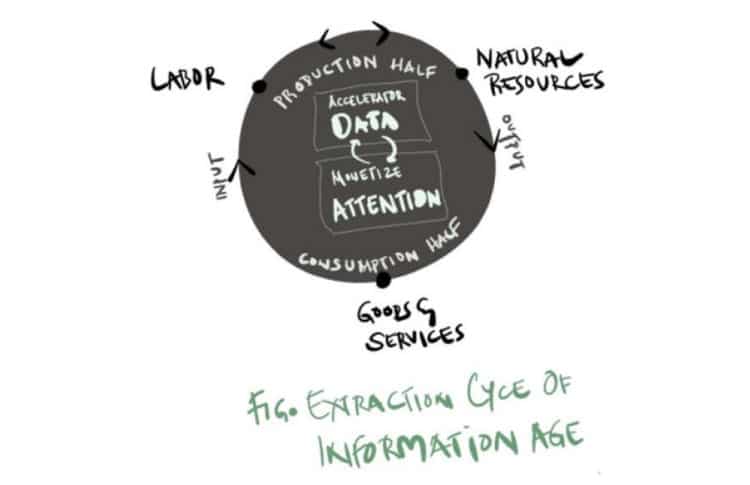
The value extraction cycles of the Information Age monetized “Attention” by harnessing “Data” With a couple of centuries of experience, the modern economic institutions, have perfected the art of extracting from the people and the environment to monetize the critical elements like time and attention. With the plateauing of the attention economy, the pursuit of ‘value’ raises the question: what is the next frontier of monetization?
It is the monetization of your values, accelerated by a system of ‘inauthentic narratives
The next decade will have a shift from attention to perfection of the art of monetization of values. Not in little pockets of our economy, but in scale across all parts of the economy. A shift from fight for attention vs. fight for your ethical conscience. The monetization of your ethics would be powered by an efficient plumbing system (enabled by ‘intelligent’ – supercompute powered tools) generating and distributing targeted narratives. Large companies, today have record levels of cash available to direct towards ‘narrative’ systems. The combination of unlimited capital and powerful tools will sharpen businesses to monetize values on both the left & right side of the aisle. Without this ability to resonate with the ‘consumers’ at mass, in an extremely targeted way, it will be hard for the large corporations to stay relevant in their attempts to attract consumers or talent. Today, the attention economy has harvested data enough to understand which ideology sells. Tomorrow, we will have networks established to monetize these ideologies in scale, across all industry segments.
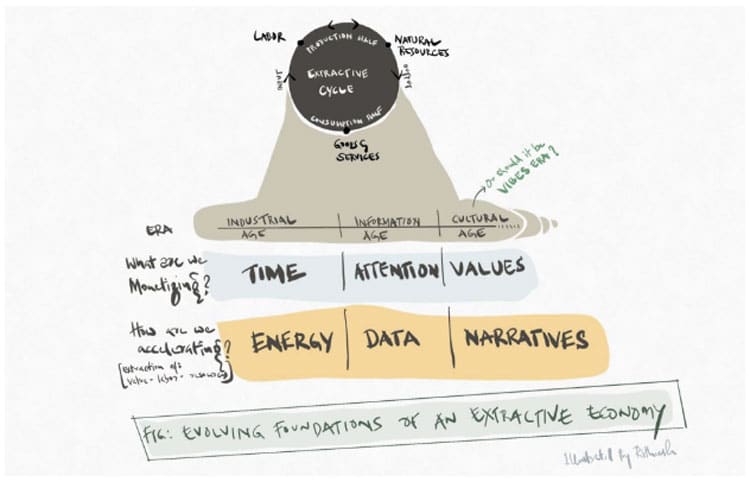
The foundation of our extractive economy is evolving to welcome the “Vibes Era” We can already see some of this trend both in external efforts of monetization and in the internal labor management practices of many organizations.
Systems of narrative to create a monetization channel
The automotive industry built a narrative of saving the planet through the Electric Vehicle (EV) revolution. Millions of people who resonated with the value of ‘saving the planet’, quickly created one of the most talked about segment of the automotive industry, leading to an additional monetization channel for almost every automotive company today. The cultural narratives on EV, even succeeded with the tax-payers subsidizing the growth of the segment. If our true objective was to save the planet, we would have directed these subsidies to innovation in the mass transit systems that would have made a significant improvement in quality of life for people at all income segments and had a positive impact on the planet. The idea of an electric vehicle is primarily to save the automotive industry and not this planet.
Similarly, recycling of plastics, as a cultural narrative was one to save the plastic industry. We have learnt that the campaigns for plastic recycling was mostly paid by the big oil companies while knowing all the challenges associated with recycling all the way back in 1970s. Fast forward to 2024, despite the millions spent on this cultural narrative of recycling, we are finding evidence of microplastics in human placenta!
The idea of recycling is primarily to save the oil industry and not this planet
In its early days, Sam Altman’s OpenAI promised to be a non-profit, an open system. The team rallied investors with the narrative of building AI tools for “the benefit of humanity” but quickly pivoted to a profit maximizing entity. This pivot from the original narrative almost had no meaningful negative repercussions. Today, Sam Altman has been driving an investment discourse, pitching for $7 Trillion towards AI chips. Sam Altman could likely succeed in attracting the dollars for his chips vision, while being one of the recent leaders who profited from inauthentic narratives.
Apple recently released this cringe worthy ad on sustainability. Apple struggles to maintain high growth as consumers hesitate to upgrade frequently due to concerns about innovation and environmental impact. The company is trying to emphasize the sustainability narrative, but a longer product release cycle might be more impactful for reducing their environmental footprint.
The idea of sustainable phones will be primarily to maintain the growth of Apple and not to improve the health of this planet.
These are success stories where business leaders took active decisions to drive cultural narrative without any meaning behind them other than creating an additional lever for revenue/wealth generation. They showed how values can be monetized. You will soon find narratives of smart kitchen segment trying to save cooking, therapy bots sector trying to save mental health, organic supplement segment trying to save your physical health, vegan meat trying to save animal lives. This list will continue to grow. The creation of these industry sub-segments is evidence of success in some of the early ways to monetize values, ideologies, principles – the ethical soul within us, only through hollow narratives.
Systems of narrative to manage labor
An extractive economy requires a constant supply of labor. Today, if you ever sit in any conversation around talent management in large companies, you quickly have executives debating about their challenges around management of workers from different generations with distinct behavior and values. Companies are already mastering their ability to build marketing narratives to resonate with values of different generations in the same workforce: a delicate dance between publicizing the news of record shareholder dividends to the Boomers and running webinars on equity (not the one referring to stocks, but the one referring to social equity) for the GenZ workers.
We will have to wait to see if the ‘climate anxiety’ riddled younger GenZ, takes the bait to join large organizations which are run by ‘who-needs-therapy’ leaders of the Boomer generation. Millennials have taken the easy bait – free breakfast and a pool table at work proved enough of an incentive. On the other extreme, weak social security systems for the elders has forced the 75 and older to be one of the fastest growing part of the labor force!
The ESG (Environment, Social & Governance) narrative, DEI (Diversity, Equity, Inclusivity) narrative are all building blocks of the incoming new model. Companies are increasingly driving equity (sustainability of planet & inclusivity of the people in the society) centric narratives both to attract talent and to stay relevant in the market. Most of these narratives are getting very polished creating new terms / concepts while limiting any meaningful discussion on even the need for these narratives.
Here’s an example of such limits in meaningful change. Companies fund many DEI initiatives to drive narratives around equity, but the laziness in the innovation is evident when most companies of scale still operate with a hierarchical org structure. The hierarchical structure of large organizations is a reflection of the caste-system in our societies that has perfected the art of extraction of labor. Even in 2024, an employee of a large company, in a lower band/designation will have limited privileges (ranging from your travel benefits to the laptop permitted to use) when compared to ‘executives’ at top end of the corporate ladder. This preferential treatment increases as you go higher in your rankings despite everyone working for the same ‘value’ generating activity.
Large companies have not innovated for over a century to find fresh ideas of organizing people. How will an archaic caste-inspired structure ever ensure equity? No equity principle has a chance of succeeding without innovating the way we organize people in our organizations. However, a faux-culture of diversity & equity can be promoted by investing into DEI narratives. It has succeeded in attracting talent. As we move ahead, similar to the shift in CEO personas of the last few decades to tech background executives, we will soon have CEO personas from sustainability & diversity backgrounds. Yes, your Chief Sustainability Officer or Chief Diversity Officer will soon be the Chief Executive Officer.
Why now?
There are two main factors that I believe is creating a perfect environment for the swelling of the narrative systems driven “faux-cultural” economy.
A full circle moment
Several institutions are at a point in time where they have run out of ideas. These institutions are desperately going back to older ideas with the hope that it works.
Culture and entertainment: Returning to monetizing nostalgia (the poorly executed fourth sequel of Matrix or well executed Barbie or Usher at your Superbowl) suggests a lack of fresh ideas in engaging audiences.
Politics: The resurgence of divisive rhetoric based on identity groups, funding violence & genocide using the same narratives of last few centuries, highlights a potential dearth of innovative solutions to address societal challenges.
Business: The return to ad-centric models and bundling practices, away from stagnating subscription models, suggests a struggle to develop novel approaches to revenue generation. I would attribute this tendency of going full circle, primarily to the erosion of creativity. Even the launch of Apple’s Vision Pro is a result of the brightest minds in our world, with access to almost unlimited resources, running out of creative ideas. The largest part of the discourse in early part of 2024 is a headset that does not solve any of the existing problems, but only creates new ones. What are we doing? It seems like we are collectively craving creative inspiration.
Loss of meaning and trust deficit
The attention economy has hit a ceiling with people quickly catching on to the fact that their attention has been extracted in ways that has left them isolated and fragmented from each other. The promise of social media was to connect people across the world. A decade of social media technologies perfecting itself, has shown that it has been net negative for the health of our society.
However, institutions of the attention economy have only accumulated the greatest amount of wealth and power in this period. Companies with the largest market-cap are all showing record profits in the recent quarters, and are simultaneously undertaking some of the biggest layoffs. For the first time, layoffs are being executed not as an existential cost saving tactic, instead used to deliver record profits. This is counter-intuitive for anyone experiencing or observing layoffs.
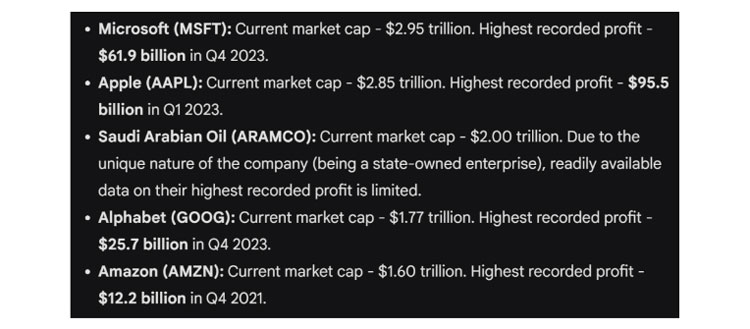
Google’s Gemini reporting on the highest recorded profits for the top 5 companies by market-cap as on 1.Mar.2024. 3 out of the 5 had historical record profits in 2023! People are left confused and disconnected. Nothing in the current capitalist economy moves by the fundamental rules that we were taught, neither do they operate true to the words that are being used by leaders of institutions. This interesting essay goes deep into why we are in between a phase where “meaning has lost its meaning”
It seems like we are collectively craving purpose & meaning.
In an increasingly isolated, fragmented society that is craving for meaning in the world we have built, powerful technologies will create content that will fill the void – just enough for people to open up their wallet AND offer their time to ideas that resonate with their ethical core. There are signs of explosion of such content and soon there will be a flood of hollow narratives that drowns inner ‘self’ of sections of society that are vulnerable to seeking meaning. We have now moved from ‘post-truth’ world to ‘post-shame’ world and the organizations that are trying to find levers of growth will lean into this behavior since we have enough evidence to show we can monetize values without having it to mean anything. There’s no more shame in hollow narratives.
What does this mean?
The Information Era seems to be giving way to a Cultural Era, or perhaps even a Vibes Era. This period is characterized by an ideology-based economy, where businesses increasingly jump on the bandwagon of hollow narratives once solely owned by media and entertainment. However, this trend carries the risk of creating a “faux-culture”, where narratives lack genuine meaning and become mere tools for profit.
Storytelling is inherent to humanity, and attempts to leverage it economically are not new. The World Economic Forum even discussed the scaling of ‘narrative market’ in 2018, encouraging leaders to understand the power of narratives that monetize markets. As CxOs develop these systems with powerful storytelling capacities, what do we do when the voices of smaller community leaders, activists, social progress advocates are further drowned out?
In a ‘post-shame’ world, I worry about the industrialization of inauthentic narratives, massproduced for profit without accountability, which could further erode trust in society. When sharing feedback on this essay, one of my friends commented that it is depressing to know that our values will be monetized. While we can enter into a sinkhole of despair, we can also push the discourse to meaningful conversations by using the same systems of narrative. There is a need to challenge the investments into technology centric innovation while there is a lack of structural innovation, as we still try to make archaic governance systems work. We have a tendency to outsource progress to the next generation or to the next hype-technology.
I strongly believe that with the right shift in our innovation funding ecosystem, we can solve today’s problems affecting the most vulnerable around us, using the tools and people we have today.
Instead of pouring $7 trillion into AI chips, we could redirect similar-sized funds towards innovating secure housing, social care systems or citizen participation in local community administration. At a micro-level, in our individual roles across the economy, we could check and challenge inauthentic initiatives right at their early stage. We all have a role to play in rebuilding trust.
To conclude, the crucial question remains: In a noisy world, can we craft and disseminate powerful narratives that are not just captivating, but also encourage and support the structural changes our society desperately needs? This is the challenge and the opportunity. By harnessing the power of effective narratives and backing them with concrete actions, we can strive to shape a future that prioritizes both cultural integrity and meaningful social progress.
Written by Ritheesh Shetty.
Have you read?
Best Fashion Schools. Best Universities. Best Medical Schools. Best International High Schools. Countries: Most Female Billionaires.
Bring the best of the CEOWORLD magazine's global journalism to audiences in the United States and around the world. - Add CEOWORLD magazine to your Google News feed.
Follow CEOWORLD magazine headlines on: Google News, LinkedIn, Twitter, and Facebook.
Copyright 2025 The CEOWORLD magazine. All rights reserved. This material (and any extract from it) must not be copied, redistributed or placed on any website, without CEOWORLD magazine' prior written consent. For media queries, please contact: info@ceoworld.biz






